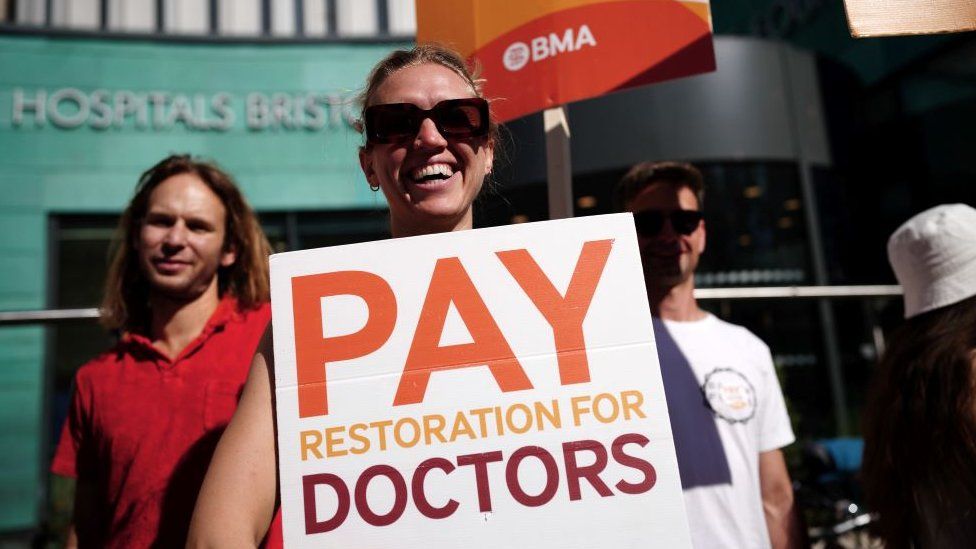Pay rise announced as junior doctors strike in England
- Published

The five-day strike in England is in protest over junior doctors' pay
NHS medics will get a pay rise of 6%, the government has said, as junior doctors in England begin their longest walkout yet over salaries.
The five-day strike in England runs until 07:00 BST on Tuesday 18 July.
Thousands of planned appointments will be postponed while more senior doctors fill in to provide emergency care, before then going on strike themselves next week on Thursday and Friday.
People can still call 999 for life-threatening emergencies.
Why are doctors striking?
The 6% pay rise announced today for junior doctors - along with an uplift of £1,250 - is in line with pay review body recommendations, but below the 35% that doctors have been asking for.
Health secretary Steve Barclay says the 35% demand is not reasonable or affordable, but doctors say it is needed to keep up with rising inflation.
Prime Minister Rishi Sunak urged the British Medical Association (BMA) to "do the right thing" and call off strikes.
BMA Council Chair Prof Phil Banfield told the BBC's World at One programme that although the 6% was a reasonable starting point, the offer may not be enough to end the dispute or stop doctors from leaving the NHS.
The latest walkouts are the fourth strike by junior doctors in England since the pay dispute began.
Junior doctors make up around half of all hospital doctors in England and a quarter of all doctors working in GP surgeries. The BMA represents more than 46,000 junior doctors in the UK.
A&E care is available, but patients are advised to contact NHS 111 or the nearest pharmacy for more minor health concerns.
People will be contacted if their appointment has to be rescheduled. GP and community appointments are unlikely to be affected.
NHS England medical director Stephen Powis said the health service was "entering an incredibly busy, disruptive period" and staff were doing all they could to maintain services and address a record backlog of patients waiting for appointments or treatment.
More than 600,000 NHS appointments in England have already been cancelled or postponed due to strikes by doctors, nurses and other healthcare workers in recent months.
Alongside strikes, hospitals have faced other challenges to get back to full capacity since Covid hit. These include staffing shortages, more emergency patients and problems discharging patients because of the lack of care in the community.
A record high of 7.47 million people were waiting to start routine hospital treatment at the end of May, up from 7.42 million at the end of April, latest figures show.
It is the highest number since the measure was introduced in August 2007, and nearly three million more than before the pandemic.
One in 20 has been waiting more than a year - although the NHS has got close to eliminating waits of more than 18 months.
'Horrendous pain like a hot volcano in my knee'
Richard McKenzie first injured his knee years ago in a moped accident
Richard McKenzie, a marketing manager from Berkshire, is in constant pain waiting for an operation for a new knee which was scheduled for today, but has been postponed because of the strike.
"The pain is like having a hot volcano in your knee and somebody sticks hot needles into the hot volcano. It's horrendous," he says.
"It means you can't sleep, you can't rest - and I can't think either," he says. "Or I have to take such a large load of painkillers that I can't think anyway."
He said his situation is "completely" affecting his life: "When you're in pain all the time you get crabby, it affects relationships, it affects how you work, it makes you snappy. It's always there and you can't get away from it."
Richard is not confident his operation will happen on the rescheduled date in a few weeks time either.
And he's worried about the impact of constant delays on his work, which requires regular travel to Germany.
Meanwhile, planned strikes by junior doctors in Scotland this week were called off after a new pay deal was offered - a 17.5% increase over two years.
More senior doctors - consultants - who are filling in to provide emergency care during this strike, will be going on strike themselves on Thursday 20 and Friday 21 July.
Consultants will be providing what is being described as "Christmas Day cover" - emergency care will be provided, along with a very limited amount of routine work.
Radiographers, who carry out scans on patients, have agreed to strike over pay in some parts of England this month too.
Are you a doctor with a view on the strike? Are you a patient affected? Share your experiences by emailing haveyoursay@bbc.co.uk, external.
Please include a contact number if you are willing to speak to a BBC journalist. You can also get in touch in the following ways:
WhatsApp: +44 7756 165803
Tweet: @BBC_HaveYourSay, external
Please read our terms & conditions and privacy policy
If you are reading this page and can't see the form you will need to visit the mobile version of the BBC website to submit your question or comment or you can email us at HaveYourSay@bbc.co.uk, external. Please include your name, age and location with any submission.
Sign up for our morning newsletter and get BBC News in your inbox.
Related Topics
- Published25 June 2023
- Published13 July 2023
- Published13 July 2023